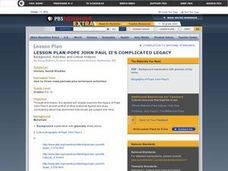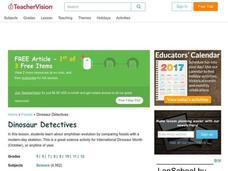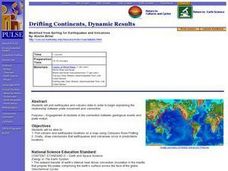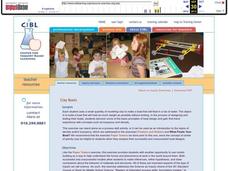Curated OER
As You Like It
Learners use online resources in order to examine patterns of imagery in As You Like It. By comparing these patterns to those of other Shakespeare plays, students draw conclusions about the different reasons Shakespeare uses imagery in...
Curated OER
Exploring the Landscape
Students determine the monotonicity and concavity properties of a function, then apply the First Derivative Test and draw conclusions about the first and second derivatives from these properties.
Curated OER
Termite Trails
Students observe the behavior of termites and draw conclusions about their behavior. They record data as to termite behavior and recognize elements in the experimental design which must include a hypothesis.
Curated OER
Pope John Paul II's Complicated Legacy
Learners closely examine the legacy of Pope John Paul II as well as that of other historical figures and draw conclusions about how prominent individuals are judged over time.
Curated OER
Caesar
Students examine patterns of imagery in Caesar by using online resources. Students compare the patterns they see to those they've found in other Shakespeare plays. Then students draw conclusions about why Shakespeare might have used the...
Curated OER
King Lear
Students examine patterns of imagery in King Lear by using online resources. Students compare the patterns they see to those they've found in other Shakespeare plays. Then students draw conclusions about why Shakespeare might have used...
Curated OER
Hamlet
Young scholars examine patterns of imagery in Hamlet by using online resources. Students compare the patterns they see to those they've found in other Shakespeare plays. Then young scholars draw conclusions about why Shakespeare might...
Curated OER
Richard II
Learners examine patterns of imagery in Richard II by using online resources. Students compare the patterns they see to those they've found in other Shakespeare plays. Then learners draw conclusions about why Shakespeare might have used...
Curated OER
Driving Forces Forestry In Canada
Students discuss the natural and economic impact of forests and forestry. Using given statistics they construct different types of graphs in which they make observations and draw conclusions.
Curated OER
OBSERVING THE ROLES OF MALES AND FEMALES IN THE NURTURING OF THE YOUNG THROUGHOUT THE ANIMAL KINGDOM
Students watch animal videos to identify and compare the male/female roles of different species of animals. They draw conclusions and compare those roles to those of humans. They discuss how the human male/female roles have changed...
Curated OER
McCadam's Quarterly Report
Fourth graders problem solve a problem from a local business using data, generating graphs, and draw conclusions. They submit their findings in a business letter format with feed back from a company's plant manager.
Curated OER
Responding to Alcohol: What's Important?
Students examine the effects on motor functions in mice. They make observations and graph their data. They analyze the data and draw conclusions in each of the three experiments.
Curated OER
Scientific Research
Students examine the process of scientific inquiry. They develop twenty questions, categorize the questions, develop a research proposal, analyze data, draw conclusions, and explain how their research connects to the state standards.
Curated OER
Predator Prey Population Links
Fifth graders relate population of animals to its available food supply. They participate in an experiment and gather information. They use the data to draw conclusions.
Curated OER
Where Did It Begin?
Young scholars work together to research the oldest forms of writing in the world and the materials used to create them. They explore the cultures that used this early form of writing and draw conclusions about why specific symbols were...
Curated OER
Dinosaur Detectives
Students examine amphibian evolution by comparing fossils with a modern-day skeleton. They experience the scientific thought process of drawing conclusions from limited paleontological data. Student groups align the figures with the...
Curated OER
Finding Buck Henry
Students read and demonstrate competence in the general skills and strategies of the writing process via the novel "Finding Buck Henry." They recognize complex elements of plot. Students analyze devices used to develop characters in...
Curated OER
A Sense of Place
Students evaluate stories, customs, and pieces of literature and draw conclusions about people who have lived in New Mexico. They analyze how water helps define the character of an area.
Curated OER
Water Stories
Students interpret historical accounts, stories and customs to draw conclusions about the people who populated New Mexico and their relationship to water. They describe the human and natural characteristics of places in New Mexico.
Curated OER
CSI Clamshell Investigation
Students explore predator/prey relationships. They research information on moon snails and claims. Students draw conclusions from the data collected. They use math and graphing to determine if there is a relationship to the clam's size...
Curated OER
Drifting Continents, Dynamic Results
Students plot earthquake and volcano data using a Compass Rose Plotting. They explain the relationship between plate movement and connection. They draw conclusions that earthquakes and volcanoes occur in predictable locations.
Curated OER
"Region" Out to Everyone: Geographic Regions Defined
Students define the term region. They collect data about New England after watching a short video. They organize the information into a regional concept map. They draw conclusions based upon their data collection and analysis.
Curated OER
Escape From the Antlion's Pit
Students draw conclusions about the effectiveness of antlion's pits in catching prey. A brief review of the antlion and its hunting habits is conducted. After watching a video about the use of pits to catch prey, students complete a...
Curated OER
Clay Boats
Seventh graders are given the opportunity to use model-building as a way to help comprehend the forces and phenomena at work in the world around them. They use both successful and unsuccessful models to make inferences, refine...
Other popular searches
- Nonfiction Draw Conclusions
- Draw Conclusions in Reading
- Draw Conclusions Lesson
- Draw Conclusions Reading
- How to Draw Conclusions
- Infer and Draw Conclusions
- Draw Conclusions in Literacy
- Draw Conclusions in Fiction
- Fiction Draw Conclusions
- Draw Conclusions Worksheet

























